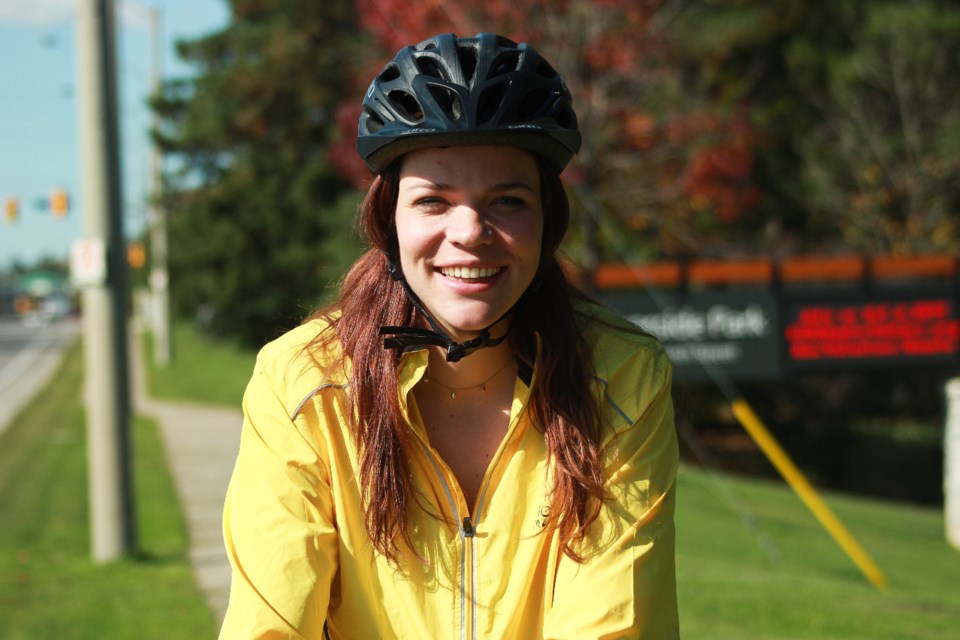A woman is on a journey to bike 1,100 km in 30 days to raise awareness for human trafficking by having talks in 26 cities along the way.
Former Guelph resident Dominique Holley’s stop in her former hometown Tuesday is the fifth city on the route across the province which began in Windsor on Oct. 1 and ends in Ottawa Oct.31.
Having biked 415 km so far, she has 685 km to go.
Holley has documented her journey so far on her campaign Facebook page, which seeks to encourage individuals to take action in any capacity they are capable of.
She is also in the process of creating a documentary after personally meeting with several human trafficking survivors over the years.
“I think that if each person decided to be the one to speak up about it, talk about human trafficking, talk about fighting it, talk about how to end it, it would make a significant shift,” says Holley.
“If everyone took on the attitude that I can be the one to create the shift where I live, it would create that tidal wave of change.”
She says while she knows it's unlikely for most people to bike 1,100 km in a month, there are numerous ways people can use their skills, time and ideas to advocate for human trafficking survivors.
“If you're a parent, you can advocate for the school board and your teenager’s school to have educators come in and talk to the teachers and the students of what human trafficking looks like. If you're a nurse, you can advocate for education. If you’re a lawyer, you can advocate for the area of law you practice,” says Holley.
Holley says people just don’t know how common human trafficking is.
According to Statistic Canada, 66 per cent of human trafficking cases took place in Ontario, totalling 723 cases between 2009 to 2016. However, human trafficking cases are always underreported due to the complex nature in recognizing the cases.
With parents who strongly advocate for social justice, she says she has always been aware of what human trafficking looks like in a global sense and as a teenager thought it didn't exist in Canada — a misunderstanding she says many Canadians have.
She says four years ago, she read an article about human trafficking in Ontario which increased her understanding about the reality of human trafficking in the province. A person who she volunteered with once told her, ‘the understanding of what human trafficking is today is what domestic violence was 30 years ago,’ where victims are often blamed for not leaving.
“Often, the way human traffickers leverage is emotionally and mentally and so often the trafficker is the only point of connection that the person has,” says Holley.
She says with a target demographic of young teens who feel vulnerable and isolated, the traffickers know exactly what they’re looking for.
“They can find a person on social media. They have a radar. They will go to malls and give a compliment to someone in the age range and based on that compliment, based on how the girl responds, they know if the girl is susceptible or not. The survivors talk about it all the time,” says Holley.
She says while school boards have now begun to allow educators to come into the schools to speak about human trafficking to Grade 11 and 12 students, the education must be available to kids earlier.
She says the inspiration to push through to complete her ride comes from the stories she heard of survivors over the years.
“Yesterday when I was doing the bike ride, I could feel myself get emotional because I'm like I'm so tired, my legs are sore, I needed to eat. I could feel myself starting to get emotional so I definitely have those downtimes,” says Holley.
She says she thinks of stories shehas heard like the one of a mother whose daughter was trafficked out of high school and her parents knew nothing until the daughter had a mental breakdown which, resulting in a ripple effect of fear and terror towards the parents, the family and friends.
“She would be picked up from school, sold for sex and dropped off back at school,” says Holley.
She says you can’t wait for the right time to take action.
“If you work for the perfect timing for something, you’ll never start,” says Holley.
